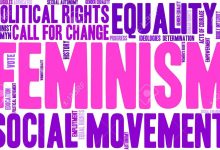The Deception of Glamorised Housewife Culture

|
Getting your Trinity Audio player ready...
|
The idea of being a housewife, also known as a “trad wife,” or completely dependent on a man, is a fantasy many women have believed to be great. However, this perspective ignores the challenges and limitations that come with it. Some women are drawn to this lifestyle because it appears aesthetically pleasing, yet they often overlook the demands and realities of modern life.
The desire for this lifestyle often stems from cultural influences, social expectations, and personal preferences that make it attractive, comforting, or secure. Women have been conditioned to believe that their primary purpose is marriage and motherhood, which often leads to the dismissal of education, skills, and personal achievements as unimportant. This mindset discourages women from pursuing their ambitions, as they are taught that once they marry, their focus should shift entirely to caring for their husbands and children, leaving little or no room for their careers or personal growth.
The idea of relying on a man and not worrying about finances can be thrilling and satisfying for some women, as it aligns with their expectations of being pampered and cared for. However, nothing should be appealing about surrendering your financial power and autonomy to a man. Embracing financial independence is not just about managing money; it is about fostering a sense of self-worth and capability that enables women to thrive on their own terms.
The demands of being a housewife can be overwhelming, with responsibilities that leave little or no room for rest or self-care. The sacrifices are real, yet rarely acknowledged. However, that’s why we are here and happy to point it out.
Here are 10 reasons why being a housewife is dangerous
- Lack of financial independence: Losing financial independence means experiencing less freedom, not more. Marriage should not be your financial plan or strategy. Why would an adult choose to live like a child, relying on someone else for every penny?
- Vulnerability to abuse: In this kind of situation, you become vulnerable to various forms of abuse, including emotional, physical and financial abuse. This dependence paves the way for emotional and psychological manipulation. Financial dependence can make it difficult to leave abusive situations and often leads to unequal dynamics that undermine personal autonomy. Research shows that housewives are more likely to become victims of domestic violence than women who work. According to a report by the National Coalition Against Domestic Violence (NCADV), financial abuse occurs in 99% of domestic violence cases. Housewives who depend solely on partners for income are particularly vulnerable. Many victims stay in abusive relationships out of fear of being unable to provide for themselves and their children.
- Unforeseen circumstances: While no one wishes for any unfortunate situations, what happens if the sole provider becomes terminally ill or dies? What if he loses his job or his business fails? What if he doesn’t turn out as good or perfect as he appears to be? What if infidelity occurs? And what if you find yourself needing to leave, only to realise you have no source of financial independence? Life is unpredictable. The death of a husband has a profound impact on widows, often leading to heightened poverty, social stigma, and mental health challenges. This situation is exacerbated if the woman was a housewife or not employed during her husband’s life, leaving her particularly vulnerable and lacking financial resources to support herself and her children.
- Loss of identity: It becomes hard to maintain one’s sense of self, and one may lack a personal identity where one is seen as just a mother, wife, or daughter. One’s identity becomes tied to only being someone’s wife, thereby reducing one’s individuality and goals.
- Potential for regret: Some women may regret their decisions later in life for not pursuing their careers or educational goals, leading to dissatisfaction. Some young women choose the path of becoming housewives to seek comfort and stability and avoid ambition, only to end up feeling unfulfilled and longing for the aspirations they set aside. Viewing your life ambitions and career as unimportant and choosing to rely solely on a man is a risky decision. This mindset can limit your personal growth and fulfilment. Pursuing your goals and aspirations is essential for building a secure and independent future. In an Essay by Jennifer Stavros, a woman shares her regret for trading her career ambitions to become a housewife as she initially believed it was the right thing to do.
- Gap years: It is hard to get back into the job market after being out for a long time, especially when unexpected situations arise. Transitioning back into the workforce after a long gap year can be challenging. Taking a long time away from your career can lead to outdated skills, making it harder to re-enter the workforce.
- Women in leadership: There is a need for women to be in positions of influence in economic and political spheres to create policies and laws that favour, empower and protect women while benefiting the society. Women in these roles can address daily challenges and injustices such as femicide, rape, workplace inequality, and lack of access to education and healthcare. By being at the table, they ensure that women are represented and that issues concerning women are not overlooked.
- Mental Health Issues: Being a housewife can be mentally draining, involving the challenge of balancing a sense of self, managing emotional challenges, dealing with loneliness and depending on their partner for money. These pressures can lead to serious mental health issues such as distress, depression and burnout.
- Power Imbalance: Power imbalance can affect emotional well-being, financial security and overall quality of life. Greater financial control leads to reduced autonomy. When the husband holds most of the decision-making authority, the housewife may feel marginalised, influencing choices regarding finances, household management, and family planning.
- Increased stress in managing household and family: Being a housewife can lead to increased stress from juggling household and family responsibilities, social isolation, and the pressure to meet societal expectations.
Ultimately, it’s important to remember that a man can leave or change at any time, but your education, skills, business, and degree will always be a part of you. Focus on your goals, pursue an education or degree, build a business, and invest in your career. Empower yourself so that, with or without a man, you can thrive and stand on your own. Your autonomy is your power. Feminists have tirelessly fought for your right to work and receive equal pay; take advantage of these opportunities. In the past, women were not allowed to work or enter professions like law or medicine and had limited access to education. Many women worked and were paid only a fraction of what men earned.
Wake up from the fantasy of being financially dependent on a man and confront reality. The idea that a shining knight in armour will come to rescue you is a myth. True empowerment comes from controlling your finances and life, allowing you to pursue your goals and aspirations without relying on someone else.






